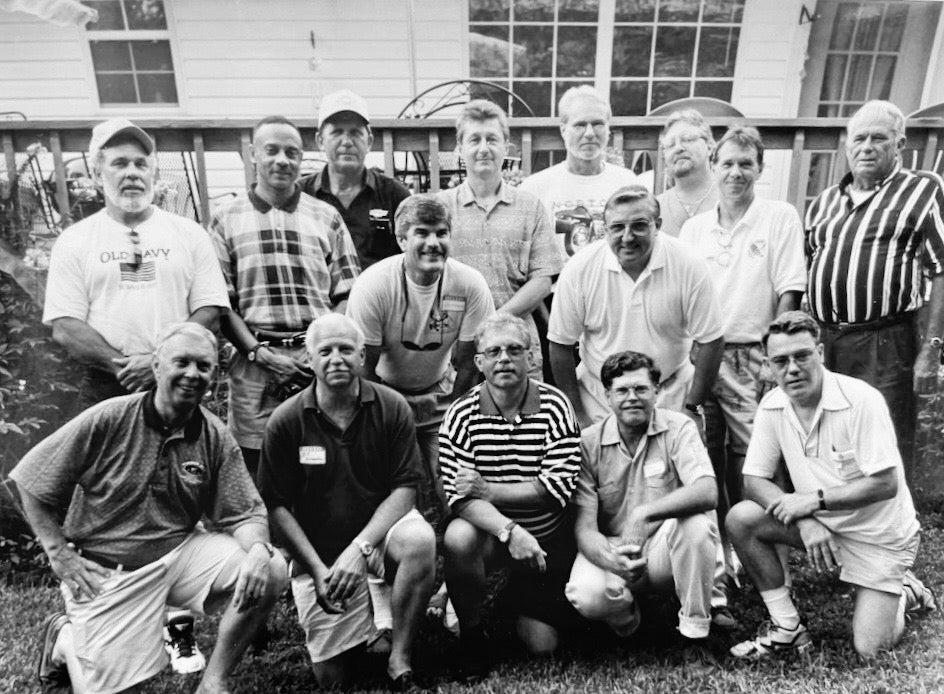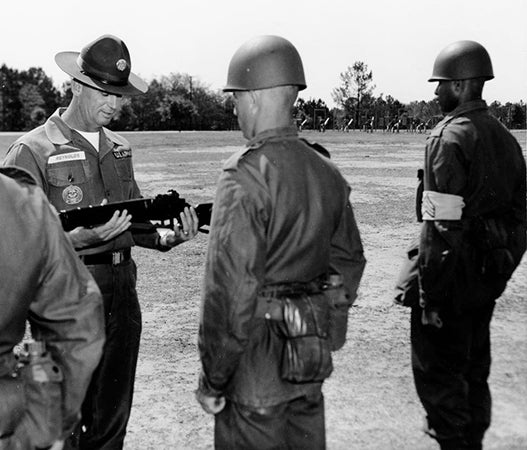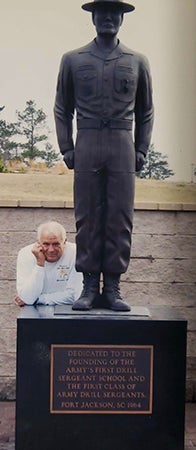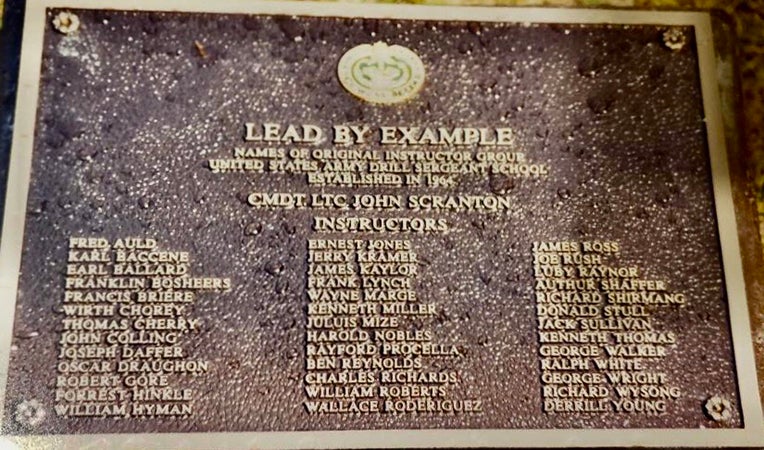Benjamin L. Reynolds, Command Sergeant Major, U.S. Army, Vietnam Two Silver Stars – Conclusion
Published 1:00 pm Friday, October 6, 2023

- Photo of the 1997 reunion of Company B, 3rd Battalion, 12th Infantry Regiment. The reunion was held at the home of CSM Ben Reynolds and his wife, Helen. Pictured are: [L-R kneeling], Allen Bishop, Bill Gricenko, Harry Crandall, John Luhman, Jim Siver Jr., [standing], Russ Gipson, Charles Redwine, Paul Dunnaway, Joe Espillac, Pete Pastecki, Wayne Dunning, Eddie Gahr, Robert Ur, Barry Wagner and Ben Reynolds. Those attending but not pictured: Bud Armstrong, Tom Jackson, John Mikula and Frank Jeffreys. [Photo: Steve Reynolds]
|
Getting your Trinity Audio player ready...
|
Continued from Part 1 [action that took place on Feb. 26, 1968, resulting in Reynolds being awarded the Bronze Star for Valor].

Sergeant First Class Benjamin L. Reynolds, wearing the campaign hat of a Drill Sergeant, inspects the rifle of a trainee at Fort Rucker Army Base, Alabama, in April 1964. At that time, SFC Reynolds was the only Drill Sergeant at Fort Rucker. The Drill Sergeant insignia on his right breast states, “This we’ll defend.” [Photo: Steve Reynolds courtesy of The Army Flier, April 22, 1964].
Once airborne, they headed back to the hill where the NVA still held the high ground above his company. After he was on the ground, First Sgt. Reynolds joined first platoon in the assault upon the hill that was still being held by a vastly superior NVA force. Reynolds, who was called “Top” by the men in the company [a term given to their First Sergeant], was quick to realize that part of his company had been cut off from the rest.
Quoting from the Army report that up-graded Reynolds’s Bronze Star to a Silver Star: “During the initial assault, the First Platoon leader was wounded, and without hesitating, First Sgt. Reynolds assumed command… Placing himself in constant danger by moving and communicating under fire, he effectively employed the platoon and placed effective fire on the enemy and once the company was up and moving, took the objective. Once on the objective, he continued to expose himself while organizing, directing care and evacuation of the wounded …First Sgt. Reynolds provided inspirational leadership and extraordinary courage in heavy combat. This was critical for the 1st Platoon and B Company’s successful mission accomplishment…This resulted in the capture of the Headquarters and Command Post of the 7th Battalion, 66th Regiment of the North Vietnamese Army, and the concomitant mauling of that enemy battalion.”
One of the soldiers in B Company concluded, “Because of Top’s leadership, devotion to duty and to his men, we [B Company, 3/12 4th Infantry Division] defeated a numerically superior enemy force. Top did this without concern for his own personal safety and well-being. His actions were in keeping with the highest traditions of the 4th Infantry Division, and reflect great credit upon himself and his men.”
Reynolds participated in more than 50 air assaults to earn an Air Medal with one Oak Leaf Cluster [signifying at least 50 combat air assaults]. First Sergeant Reynolds’s Bronze Star was up-graded to Silver Star in 2008 because of the testimony of his men. As proud as he was of the two Silver Stars, Ben Reynolds was quick to deflect credit to others. He was most proud of the number of young men he had helped train.
Reynolds described his philosophy as a drill sergeant, “When I was promoted to First Sergeant, I was still working with trainees. I had been working with trainees for 26 cycles as a drill sergeant. I had families from all over the U.S. coming to visit their sons or husbands when the trainee had free time on weekends. I had families say to me, ‘So you’re the sergeant that doesn’t cuss or get drunk and yell and scream at the recruits…Just let me shake your hand…My son tells me you’re the best.’”

CSM Ben Reynolds beside the statue dedicated to the first class of Drill Sergeants to graduate from the Drill Sergeant School in 1964. Thje statue stands at the Drill Sergeant School at Fort Jackson, S.C. [Photo: Steve Reynolds]
“A platoon consists of 55 men, a company was about 190 – 220 men, five companies per battalion for approximately 1,100 men…So let’s say that I was drill sergeant for 275 men for 26 cycles, which is about 7,150 men that I was den mother/father, finance officer, house cleaner, chaplain, training doctor and most of all, a shoulder to cry on.
“As a First Sergeant, 220 men for five cycles is 1,100 men, times five is 5,500 men. As Sergeant Major, another 27,500, or a total of 40,000 men that I trained.”

Plaque dedicated to the Army’s first class of Drill Sergeants on July 1994. The class of 39 students graduated in 1964 and included SFC Ben Reynolds. He became the first graduate to become an instructor at the school. The plaque is located at the Drill Sergeant School, Fort Jackson, S.C. [Photo: Steve Reynolds]
Reynolds arrived for his second tour in August 1970 and became First Sergeant for Company B, 5th Cavalry Regiment, 1st Battalion, 1st Air Cavalry Division. Their unit was called The Black Knights and they operated in the III Corps area, north and south of Saigon to the Cambodian border. Their mission was search and destroy. B company was commanded by Captain Hugh F. Foster III [who later retired as a Lt. Colonel].
Describing their mission, Foster recalled, “We trekked through the jungle and the mountains in search of an elusive enemy who did not want to be found. Each step you took could be your last on earth, since we were always at risk of mine, booby-traps and ambush. When we did find him [or he found us], the result was always violent deadly and terrifying.
“On one field excursion, Top [Reynolds] brought an entire smoked ham on top of his rucksack. Every night he would grab the ham and a butcher knife and wander off to talk to some of the troops. I chanced to hear his conversation one night. It went like this, ‘Hey, how about a big ol’ slice of smoked ham? Pretty good, Huh? This is about the best stuff in the world. Have you given any thought about reenlisting?’”
“DFTR stands for Don’t Forget to Reenlist! …That expression came to my mind in memory of First Sgt. Benjamin L. Reynolds, in his somewhat twisted but penetrating sense of humor, which had a very positive impact on morale.”
At this stage in the war, senior NCOs like Reynolds, did not often lead air assaults. According to Lt. Col. Foster, “Top Reynolds would come out every few days whenever he thought he could get away with it.” Reynolds would receive two Bronze Stars during this time. In April 1971, Reynolds was transferred to the 1st Signal Brigade as First Sergeant of the HQ Company.
In August 1971, Reynolds returned to the States and was assigned to HQ Company, 17th Battalion, 4th Infantry Brigade at Fort Jackson, S.C. After a year, he was promoted to Battalion Sergeant Major and assigned to the HQ Detachment, 1st Infantry Battalion, Basic Combat Training Brigade at Fort Jackson.
Command Sergeant Major Ben Reynolds retired from the Army in May 1974. He had been awarded the Combat Infantryman Badge, the Silver Star, the Bronze Star for Valor [later upgraded to the Silver Star], the Bronze Star with three Oak Leaf Clusters, the Meritorious Service Medal, the Air Medal with Oak Leaf Cluster [signifying at least 50 combat air assaults], the Army Commendation Medal, the Army Good Conduct Medal [with four knots for a total of five awards], the Army of Occupation Service Medal with Germany Clasp, the National Defense Service Medal with Oak Leaf Cluster, the Vietnam Service Medal with Campaign Stars, the Vietnam Cross of Gallantry with Palm and Gold Star and the Vietnam campaign Medal with 1960-device [awarded to U.S. service members who served anytime from 1960 till the end of the war].
Reynolds began a job as Assistant Director of Transportation for the Richland County South Carolina School District # 2. At that time, the district was the largest school district in South Carolina. Ben and Helen’s son, Steve, graduated from high school in May 1975, and they and their daughter, Gail, moved to Opp, Alabama.
In July 1994, the Army dedicated a plaque at the Fort Jackson Museum, commemorating the first class of soldiers to graduate from the Drill Sergeant School that had been established there in 1964. Ben Reynolds’s name is among the 39 names listed. He was also the first member of that class to teach at the school.
A bronze statue of a Drill Sergeant was dedicated in front of the Drill Sergeant School in October 2001. The statue commemorates the first class of Drill Sergeants to graduate in 1964.
After moving to Opp, Alabama, he continued to maintain contact with the men of Company B, 3rd Battalion, 12th Infantry Regiment. With encouragement from the men he had led in Vietnam, Ben Reynolds decided to have a reunion at his home on July 4, 1997. With Helen’s help, they hosted close to 20 men. Helen spoke about the reunion, “I feel that it was a healing experience for them. My husband was career military but most of the others were drafted and they did what our country asked them to do.” They continued to make it an annual affair in Opp until they decided to move it to St. Louis, Missouri, in 2000.
Ben missed one of the reunions because of bad health, so the men decided to bring it back to Opp in 2008. About 30 men who had served with Reynolds in Vietnam attended the reunion. During this reunion, Ben’s fellow soldiers decided that the Bronze Star he had received during the February 1968 battle, warranted an upgrade to the Silver Star. Their letters to the Army brought about a review, and Ben received his second Silver Star. The medal was pinned on Reynolds by his U.S. Congressman, Bobby Bright.
Reminiscing at the reunion, Reynolds said, “They called me Top because that is what soldiers call their First Sergeant., but from a distance, it sounded to me like ‘Pop.’…They made me feel like a father. You sleep together, fight together and work together, You’re together for a year and got a feeling of closeness.” Another soldier at the reunion said, “He walked every step with us in the Central Highlands of Vietnam and he fought every fight with us.”
From Drill Sergeant at boot camp to the battle fields in Vietnam, Command Sergeant Major Benjamin L. Reynolds was the very personification of a soldier’s soldier. The recognition of his legacy as a Drill Sergeant can be seen today at The Fort Jackson Museum.
He also left a legacy of service in Opp, Alabama, after his retirement. For more than nine years, Ben Reynolds played guitar and sang bluegrass music at the Opp Nursing Home on Sundays. He was also a member of The Dulcimer Band that played in nursing homes in Opp, Andalusia and Florala. He taught Sunday School at the Opp Nursing Home as a substitute.
Sadly, Ben Reynolds life was cut short when he was killed in an automobile accident on February 9, 2010, near Opp. His funeral was held at the First Baptist Church of Opp on February 12. Burial with full military honors followed at Peaceful Acres Cemetery. Reynolds was survived by his wife, Helen; a son Steve [Karen] Reynolds; a daughter Gail Reynolds [Kenneth] Hall; and five grandchildren.
John Vick
The author would like to thank Command Sergeant Major Reynolds’s son, Steve, for his help in telling his father’s story. He would also like to thank CSM Reynolds’s wife, Helen, for her help.
[Sources: letter from U.S. Army Lt. Col. [Ret], Hugh L. Foster III; The Dothan Eagle article, March 14, 2008; The Opp News articles, February 11, 2010 and July 16, 1997; The Army Flier, April 22, 1964]





